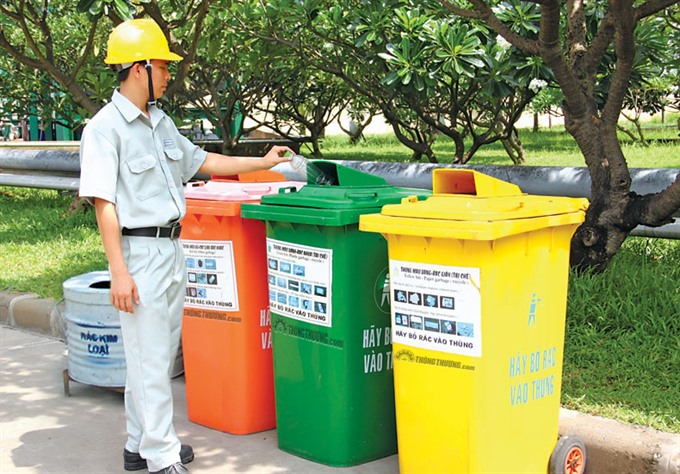Every commune or ward in HCM City will be allocated VNĐ500 million (US$22,000) this year towards addressing a funding shortage for sorting waste before it is treated.The municipal Department of Finance has said the allocation will be increased to VNĐ1 billion at the beginning of next year.

Pre-treatment garbage classification in HCM City. — Photo ecc-hcm.gov.vn
If costs rise further during the 2017-18 pre-treatment trash classification programme, the department will recalculate and submit a new allocation plan to the city People’s Committee.
Environmentalists have welcomed the allocation as a step in the right direction. They have, however, cautioned that the pilot trash classification programme implemented in several districts has to be analysed and lessons learnt so that the city’s budget is used effectively.
Trần Thị Hồng Cúc, chairwoman of Tân Thành Ward People’s Committee in Tân Phú District, said that the ward had conducted a survey first to gauge local residents’ willingness to sort their trash. Later, the local administration worked with relevant agencies to communicate and encourage residents to sort their trash, Cúc said.
Trash classification has been carried out since 2013, in the ward, she said, adding that trash collector in the district, including her ward was HCM City Urban Environment Co Ltd, which has the necessary equipment to transport classified trash to treatment plants in the city.
Moreover, classification should be carried out regularly, Cúc said.
Khuất Triều Long, head of the District 3 Natural Resources and Environment Division under the district People’s Committee, said that private trash collectors were not collecting garbage as scheduled. Their vehicles were also not equipped for transporting classified trash, Long said.
He suggested that the city authorities issue policies to help trash collectors form or become members of co-operatives.
They should be strictly fined if they do not properly sort and transport trash, he added.
Nguyễn Thị Thanh Mỹ, deputy head of the city Department of Natural Resources and Environment, said that the department is carrying out many methods in different districts, based on actual conditions.
Since July 1, all districts in the city have been asked to open bids for trash collection and transportation, Mỹ said.
Collectors winning the bid have to classify trash before transporting it to treatment facilities, and this process will be carried out throughout the city by 2020, she said.
Moreover, the department suggests that the city People’s Committee punish residents which do not classify garbage, she said, adding that the fines will be VNĐ15 million to VNĐ20 million.
According to the department, the sorting of garbage aims to reduce landfills to 60 per cent and increasing the amount of recycled solid waste to 40 per cent by 2020.
It estimates that the city produces around 8,000 tonnes of trash every day, an increase of more than 1,000 tonnes per day over 2016, it reported.
More than 80 per cent of this trash is sent to landfills, and this is a huge obstacle in the city’s efforts to reduce environmental pollution. — VNS